Interesting Facts About Wolves and Their Behavior
Interesting Facts About Wolves and Their Behavior
Table of Contents:
- Introduction to Wolves and Their Behavior
- The Different Species of Wolves
- How Wolves Communicate and Hunt in Packs
- The Role of Wolves in Ecosystems
- The Importance of Wolves to Wildlife Conservation
- Conclusion: Understanding the World of Wolves
Interesting Facts About Wolves and Their Behavior
Wolves are among the most fascinating and misunderstood animals in the wild. Known for their complex social structures and pack mentality, wolves play a crucial role in the ecosystems they inhabit. In this article, we will explore interesting facts about wolves, their behavior, and their importance in nature.
1. The Different Species of Wolves
There are several species of wolves found across the globe, with the most well-known being the gray wolf and the Arctic wolf. The gray wolf, also known as Canis lupus, is the most widespread and can be found in North America, Europe, and Asia. The Arctic wolf, a subspecies of the gray wolf, lives in the cold environments of the Arctic, where its thick white fur helps it survive extreme temperatures. Other species include the red wolf, which is native to the southeastern United States, though it is critically endangered. Each species of wolves has adapted to thrive in different environments, from forests to deserts and tundras.
2. How Wolves Communicate and Hunt in Packs
Wolves are highly social animals that rely on strong communication skills to survive. They use a combination of vocalizations, body language, and scent marking to communicate with each other. The iconic wolf howl, for example, is used to communicate with other members of the pack over long distances, often signaling territory or calling the pack together. Wolves also use body language, such as tail position and ear movement, to show dominance or submission within the pack hierarchy.
When it comes to hunting, wolves work together in packs to bring down large prey, such as elk, deer, or bison. Their cooperative hunting strategy allows them to take on animals much larger than themselves. The pack works as a team, with some wolves chasing prey and others waiting in ambush. This highly organized behavior increases their success in securing food and helps ensure the survival of the pack.
3. The Role of Wolves in Ecosystems
Wolves are apex predators, meaning they are at the top of the food chain and have no natural predators. This status makes them essential to maintaining the balance of the ecosystems they inhabit. By controlling the populations of herbivores like deer and elk, wolves prevent overgrazing, which can damage vegetation and negatively impact other species. One famous example of wolves‘ impact on ecosystems is their reintroduction to Yellowstone National Park in the 1990s, which helped restore balance to the park’s ecosystem by reducing the number of deer and elk that had overgrazed the landscape.
4. The Importance of Wolves to Wildlife Conservation
Despite their ecological importance, wolves have faced persecution and habitat loss due to human activities. Historically, wolves were hunted to near extinction in many parts of the world, especially in North America and Europe. Today, conservation efforts are focused on protecting wolves and restoring their populations in areas where they have been driven out. Wolves play a critical role in wildlife conservation, as their presence indicates a healthy and balanced ecosystem. By protecting wolves, conservationists can also help preserve biodiversity and maintain the health of the habitats where they live.
5. Conclusion: Understanding the World of Wolves
In conclusion, wolves are extraordinary animals with complex social behaviors, effective communication methods, and a crucial role in maintaining ecosystem balance. Their ability to hunt cooperatively in packs and their position as apex predators make them essential to the environments they inhabit. Despite being misunderstood and historically persecuted, wolves are vital to the health of ecosystems and wildlife conservation efforts. Learning more about wolves and their behavior can help us appreciate their importance and encourage continued protection for these magnificent creatures.

<ⓒ WizardMedics (wizardmedics.com)>


